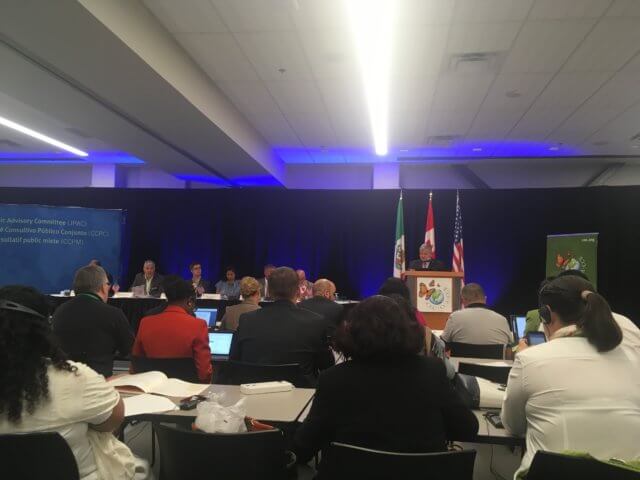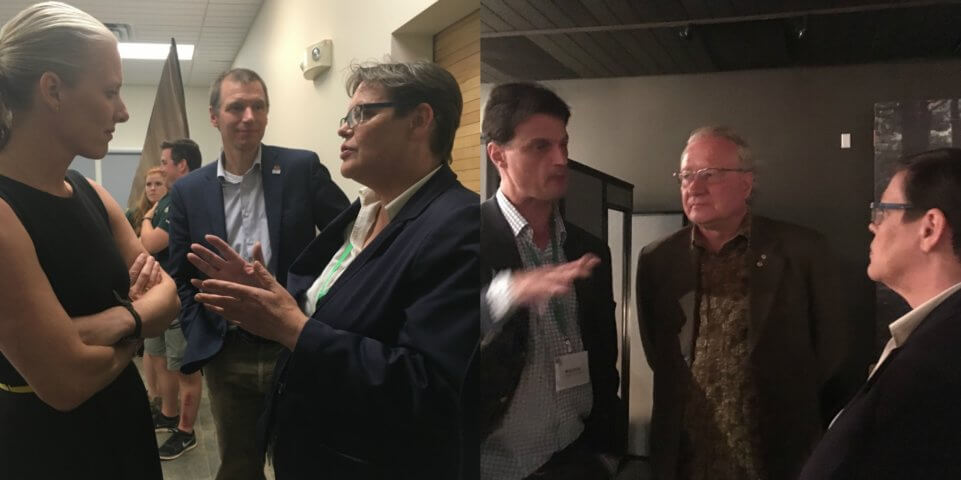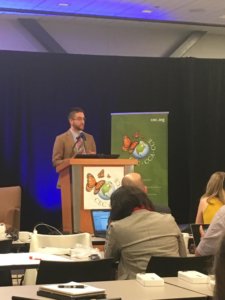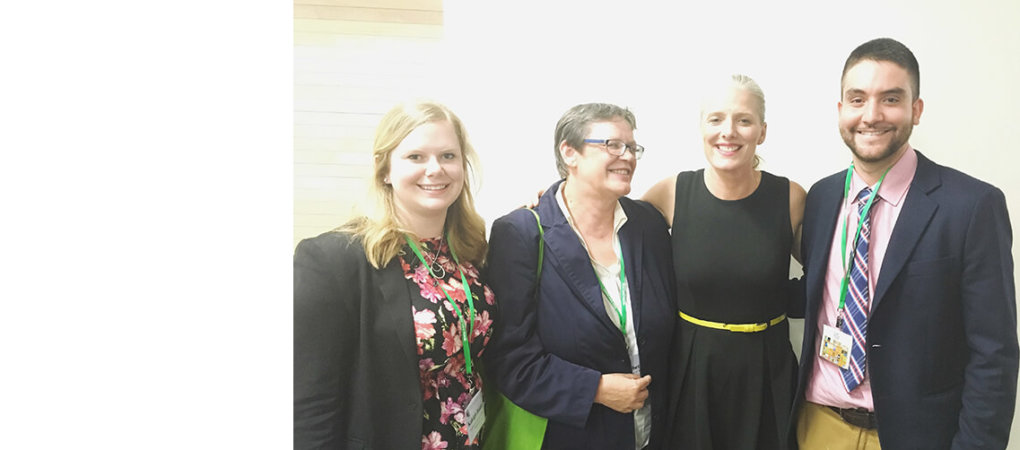On June 26, the Conservation Council’s Executive Director, Lois Corbett took a trip to Charlottetown, P.E.I., with Freshwater Intern Kaleigh Holder and Summer Student Coordinator Jimy Beltran, to attend the 24th Council Session of the Commission for Environmental Cooperation (CEC).
What is the CEC?
Formed in 1994, the CEC’s objective is to work with Canada, Mexico, and the United States to implement the North American Agreement on Environmental Cooperation (NAAEC), the environmental accord of the North American Free Trade Agreement (NAFTA). The CEC tackles environmental issues of continental concern by supporting cooperation among NAFTA members and empowering local initiatives that preserve the environment.
The 24th CEC meeting in P.E.I.
The two-day meeting took place at the University of Prince Edward Island and was open to the public, including NGOs such as the Conservation Council. Government officials from the three North American countries also attended, including Canada’s Minister of Environment and Climate Change, the Hon. Catherine McKenna, PEI’s Premier Hon. H. Wade MacLauchlan, and Hon. Robert Mitchell (PEI Minister of Communities, Land and Environment).
This year’s meeting focused on North American coastal, shoreline, and riverbank communities and sharing the innovative local solutions they have found to address the many environmental challenges they face.

First day of the CEC meeting
The first day consisted of panel discussions, along with a presentation from keynote speaker, the Hon. Robert Mitchell, who spoke candidly about the impacts climate change is having on P.E.I. To adapt to the changing climate, the province has collaborated with municipalities, universities, and ENGOs on projects such as hazard mapping, vulnerability assessments, erosion monitoring, and resources for landowners along the coast. P.E.I. has also created a Climate Change Action Plan, including an adaptation strategy, for which recommendations are currently being developed.
Of the many panels, we particularly enjoyed “Increasing resilience through cooperation: Replicating innovative local solutions to environmental security challenges.” This panel discussed local solutions to environmental risks and included speaker Kerry-Ann Charles, the Environmental Coordinator from Chippewas of Georgina Island First Nation. She discussed the sub-watershed plan her community created, as well as many community-driven projects they have completed, including ash tree monitoring, wild rice restoration, and a fish hatchery, to name a few.
Also on the panel was Dora Patricia Uribe Jimenez, the Secretary General of the Town Council of Cozumel, who spoke of how the island of Cozumel, which sees five million tourists a year, is struggling to preserve its natural environment. The island’s budget is based on the number of permanent inhabitants, a major obstacle when it comes to addressing the environmental impacts of such a large tourism industry.
The final panelist was Teresa Crean, a Coastal Research Associate at the University of Rhode Island. Rhode Island is already feeling impacts from climate change at a local level, and the university was a key actor in creating a shoreline management plan for the island. The goal is to collect data that helps coastal communities plan for a changing climate. Teresa and her colleagues created an online “toolbox” for the public, including resources such as ‘stormtools’ (which help landowners understand the vulnerability of their property to flooding), and the Coastal Environmental Risk Index (which helps municipal planners assess the risk to structures and public health during storm surges).
Overall, we left this panel feeling very encouraged as we saw examples of local projects that are making a difference on a larger scale, and each panelist highlighted the importance of building relationships and supporting local governments, something that we continue to work on every day at the Conservation Council.
To wrap up the first day, we attended a reception at Greenwich National Park, which was a great opportunity for us to connect with other participants, including government officials. We were able to learn about new and interesting projects and share what we are working on here in New Brunswick, including the development of a water strategy, meeting climate change targets, and supporting local food. Of course, there was lots of delicious food to be had because a meeting on the East Coast would not be complete without seafood!

Right: Lois Corbett talking to the Premier of P.E.I Hon. H. Wade MacLauchlan and Mark Butler from the Ecology Action Centre.
Second day of the CEC meeting
On the second day, participants brainstormed together on ways to get more youth involved in solving sustainability issues in North America. During this intergenerational workshop, our own Jimy Beltran chaired one of the sessions, covering important skills university students should possess to become champions of sustainable development in their community.

Our takeaways from the CEC meeting
Overall, we thoroughly enjoyed our experience at the meeting and really valued the opportunity to meet others from across North America who are working hard on the environmental issues we are all facing. We gained a better understanding of our role in working toward sustainability and left with a renewed sense of dedication to continue our journey to achieve a sustainable New Brunswick, Canada, and beyond. The following are some of our big takeaways from the 24th CEC Council Session:
- Collaboration across all fields and levels of government is key! When NGOs, universities, governments, communities and families come together to work toward a common goal, we collectively accomplish great things.
- Local action is crucial because global change stems from smart decisions, actions and policies at the local level.
- We are all in the same boat, as communities across North America are experiencing similar environmental changes and challenges. As such, we can share and learn from each other to create more stable, resilient communities.
- Finally, engaging youth is paramount to building a sustainable future.
Recommended Links:
- Read our latest EcoNews – Seven dead right whales devastating blow: expert.
- Learn more about the Conservation Council’s Climate and Energy Solutions, here.
BE PART OF THE SOLUTION
Your support helps fund programs and initiatives to help protect the environment.

